By Alan Schultz
Spring 2022 Newsletter
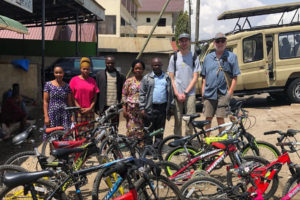 In November 2021, Dave Schweidenback and I went on a trip to Arusha, Tanzania, to make a visit to our partners at the Norbert and Friends Missions. While Pedals for Progress has made shipments to Tanzania in the past, our relationship with Norbert and Friends is still fresh, starting in the fall of 2019. We took the opportunity to meet Norbert and his dedicated team, give advice, and to learn from them on both a professional and cultural level.
In November 2021, Dave Schweidenback and I went on a trip to Arusha, Tanzania, to make a visit to our partners at the Norbert and Friends Missions. While Pedals for Progress has made shipments to Tanzania in the past, our relationship with Norbert and Friends is still fresh, starting in the fall of 2019. We took the opportunity to meet Norbert and his dedicated team, give advice, and to learn from them on both a professional and cultural level.
Arusha was busy. Fast moving taxis, buses, trucks, and motorcycles dominate the roads. The biggest takeaway was the sheer number of people who walked among these fast-moving vehicles. Everyone walks. You’d often see small children, five or six years old, walking with their much younger siblings in large groups. Mothers walk with babies on their backs. Marching squads of school children in matching clothes rush to and from school. Even along desolate, secluded roads you would pass people every mile, wondering how they got there. The number of bicycles was high, and it’s clear why bicycles are important – the pace of living is fast, and you need to keep up to make a living.
There is so much activity, so much movement, that you need a smart way to keep up. The bicycle fills this need. It shrinks the massive size of the country and makes distance more manageable. You instantly see the benefits when passing school children miles away from their schools. You see how the further you get from the main city, the more life gets stretched out. The doctor is further, schools are further, markets are further, everything is further away, yet the need to reach these destinations remains.
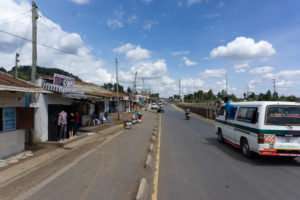 Moving along the roads you notice that nearly every home is transformed into a storefront during the day. Tin roofs cover the cement buildings, many open to the street, so you can get a glimpse of what’s inside. Hairdressers, art sellers, convenience stores, grocers, food vendors, clothing stores, carpenters, masons. It seemed that all business was done inside or at the doorstep of someone’s home. This began to excite me; I wanted the chance to meet some of these people who ran these shops, especially those associated with Norbert and Friends Missions.
Moving along the roads you notice that nearly every home is transformed into a storefront during the day. Tin roofs cover the cement buildings, many open to the street, so you can get a glimpse of what’s inside. Hairdressers, art sellers, convenience stores, grocers, food vendors, clothing stores, carpenters, masons. It seemed that all business was done inside or at the doorstep of someone’s home. This began to excite me; I wanted the chance to meet some of these people who ran these shops, especially those associated with Norbert and Friends Missions.
We met with Norbert and his team several times during our trip. We were able to talk about our organizations and exchange expectations, problems, and plans. Seeing their bicycle operation was an incredible experience. Their bike shop was like many of the shops along the main roads. It was modest, bare, but getting the job done. They had a handful of bikes on display with another 20 or so in storage as they were getting down to the last of their shipment. This was good to see, as it means the 444 bikes we shipped in July 2021 have been successfully distributed.
What blew me away most was recognizing some of the bicycles that I had a direct hand in loading. There was even a small motor we shipped that was donated by an individual at Faith Lutheran Church in New Providence, New Jersey! After making the long journey, standing there in the middle of their shop in Tanzania was an impressive reminder of how far our goods travel.
As we started to meet people, the significance of what we do continued to bloom. One of the groups associated with Norbert and Friends Missions is Master’s Men Africa, a religious men’s group focused on bringing awareness to mental health among men in Tanzania and Kenya. They advocate for removing the stigma of talking about mental health among men and they bring awareness to the high suicide rate of men throughout Africa.
I spoke with a new graduate of the group named Abura Markson from Uganda. We shared stories and spoke about our organizations. He was very interested in hearing about Pedals for Progress and happy to know that we were working so closely with Norbert. Talking with him made me realize a nuanced and overlooked aspect of the P4P mission. Poverty is a tremendous weight that people bear and deal with, in a multitude of ways. The emotions associated with poverty, such as shame, helplessness, and depression, can well and bubble within a person and across a community. Africa has the highest suicide rate in the world. Whatever the reasons may be, there is no doubt that extreme poverty has something to do with it. It was in that moment talking to Abura that I realized what we are doing could be saving people from taking their own lives, through the simple act of donating a bicycle.
Joel, our main point of contact with Norbert and Friends, and Sanai, an employee of Norbert’s, graciously took us around the city of Arusha and the surrounding areas, to introduce us to some of the recipients of our sewing machines.
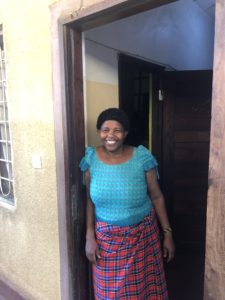
One of the first people we met who received a Sewing Peace machine was a woman named Sarah. Her small sewing studio is in the center of Arusha several levels up inside a multi-use apartment building. The small, dimly lit room, six by twelve feet, overflowing with fabric, was a sure signal of a hard-working individual. Sanai translated for us and retold bits of her story. She has been sewing for six years and since then has been able to put her children through school. Her four children are either now enrolled, or graduated university. She stays busy by making custom dresses, producing two or three elaborate dresses per day.
Access to electricity is the main challenge brought up by everyone we visited, Sarah being the first to mention it. The machines that are donated to us are mostly electric machines, and access to reliable electricity is simply something that the infrastructure of Tanzania cannot maintain. There is access but it’s sparse, as it will frequently shut off without warning with no telling when it will return. Manual treadle machines are great but older women like Sarah, who work long hours behind the machine, feel tremendous strain on their knees. Sarah mentioned how she likes to alternate to utilize the moments of electricity and to give her joints a rest.
Sarah also told us about the challenge of finding specific and specialized machines and attachments. At our collections we often say, “if we get it, they get it.” Sewing Peace simply does not have the capacity to seek out specific machines like overlock machines, which are highly sought after by independent seamstresses. These machines are highly desirable but relatively rare at our collections. At our most efficient we try to send at least two of these machines with every pallet of Sewing Peace sewing machines. However, that only accounts for two out of seventy-two, and even that we cannot guarantee.
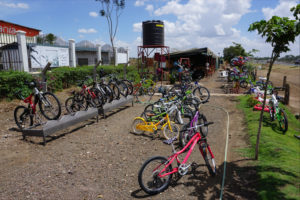 We moved a little further outside of Arusha, passing a road-side bike stand where we took a moment to stretch our legs and talk bikes. This shop at the crossroads of two main roads was relatively large, with a good range of quality bikes. We took the moment to explain to Joel and Sanai about bicycle quality differences so they could price P4P bikes accordingly. Our partners must be able to provide a fair range of prices, while also maximizing their profits by selling quality bikes to those that can afford them.
We moved a little further outside of Arusha, passing a road-side bike stand where we took a moment to stretch our legs and talk bikes. This shop at the crossroads of two main roads was relatively large, with a good range of quality bikes. We took the moment to explain to Joel and Sanai about bicycle quality differences so they could price P4P bikes accordingly. Our partners must be able to provide a fair range of prices, while also maximizing their profits by selling quality bikes to those that can afford them.
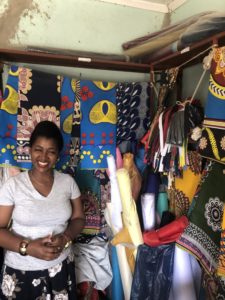
About 45 minutes outside of Arusha, we met a second sewing machine recipient, named Rachel, who has been running her shop within a busy market area for five years. She commented on how she loves the quality of her Sewing Peace machine but still runs into the same problem operating an electric machine on an unpredictable power grid. She works from the center of her small shop that has a counter with various sewing notions enclosed in a glass case. The back three walls have shelves filled with hygienic products, larger spools of thread, and a large assortment of fabric for sale.
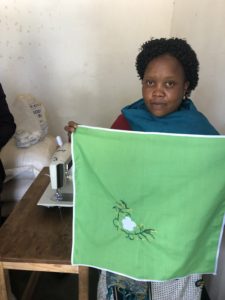
Later, we met Danielle, Norbert’s wife, who has been running a small shop in their neighborhood for the past two years. Her shop is very similar to Rachel’s, as she sells various goods surrounding her sewing machine in the middle of her shop. She mostly uses her shop as a convenience store for the neighborhood, selling soap, candy, cooking oil, and other goods. She uses her sewing machine to supplement shop income. She specializes in embroidered cloth used as dining mats or decoration. It is incredibly impressive as she uses a basic sewing machine to embroider flowers and other designs on colorful fabric. She takes custom orders for dresses and other commissioned design work.
It’s incredible to see firsthand how these women have created a life around one single machine. Hours upon hours of dedication have allowed them to build sturdy businesses around a specialized skill. It’s inspiring to see how they navigate problems beyond their control, all while continuing their enterprises. They either switch machines or find other ways to make money in the off time. Our machines donated by individuals in the United States end up in the hands of truly powerful businesswomen.
We left Tanzania feeling extremely satisfied. We have confidence in the Norbert and Friends Missions as they showed a high level of motivation and sense of urgency to supply their community with bicycles and sewing machines. We are excited to continue our relationship with them and to continue to supply them with the used bicycles and sewing machines donated by our generous donors throughout the tri-state area. The support we receive from our donors, volunteers, and organizations in the United States lifts the lives of others by helping build business, improve mental health, provide reliable transportation, and give hope and ambition to those who eagerly need a helping hand.
